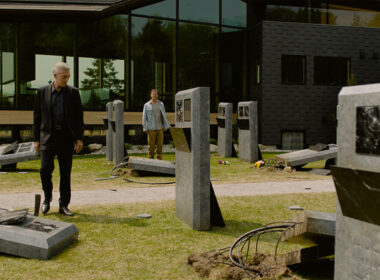Rating: ****
They say write what you know, and a writer feels most liberated when writing about writing. It’s an excuse to tap into their spirit, an exercise in self-hating, as an artist scrambles up and down, arguing with oneself that whatever we do is essential, elevating, and valuable.
It’s part of an artist’s journey to reach this stage where they look inwards after the thoughts and themes they have been mulling over for decades have been said and done. Faced with the pressure to create, it’s better to look inwards and find that little inkling of originality we know resides in us, that next thought that hopefully can save the world. Even the Coens dwelt into the depths of forced creativity in Barton Fink. However, in their sardonic way, they were not as sympathetic to a process that is, above all, ultimately narcissistic.
Enter Mia Hansen-Løve, by all accounts an intrepid filmmaker who took on the European scene like a young Eric Rohmer or Miguel Gomes more straight to the point. After hitting the jackpot with Eden and Things to Come, Hansen-Løve was looking for a new project worthy of her expectations, especially after the lukewarm reception of Maya. It’s easy to guess how Bergman Island came about – a story of a woman filmmaker Chris (Vicky Krieps), who with her also filmmaker husband Tony (Tim Roth) to a writer’s retreat in the island of Fårö, famous for being the home and muse of Ingmar Bergman. Chris writes on the windmill next to Bergman’s cottage and sleeps with her partner in the same bed where Bergman shot Scenes from a Marriage (“the film that made millions of couples get divorced”). They visit Bergman’s screening room and watch Cries and Whispers just a couple of seats next to Bergman’s spot.
Hansen-Løve is also married to an older filmmaker, Olivier Assayas, so it’s hard not to see this section of the film as an autobiographical, semi-documentary account of their marriage. It plays with the same softness of realism, reminding me of Hitchcock’s quip, “films are life without the dull bits,” but here all we get are those same dull bits – in their entertaining glory. Hansen-Løve plans each scene carefully to present a slice of life without the containments of drama or philosophy. Couples talk, they disagree with each other, they may make love, maybe, we don’t know, we don’t see it. It’s a difficult trick to master, but Hansen-Løve does it effortlessly. In a remarkable sequence, Chris ditches her partner in a “Bergman safari” to hang out with a young local film student at the beach. They walk around town, visit Bergman’s tomb, skinny-dip at a beach with no tourists but many jellyfish, and go back home. Chris comes back, apologises for leaving Tony alone with a group of Bergman nerds, and the two cuddle while reading a book.
The inciting incident comes not from this story but that of Chris. After some days with writer’s block, she comes up with the idea that could or not become a film – the story of a woman filmmaker called Amy (Mia Wasikowska) who goes to the island of Fårö for a wedding where she meets an old-lover of hers, Joseph (Anders Danielsen Lie). They laugh, have sex and think not of the consequences of the previous scene. Like Chris and Hansen-Løve, Amy admires Bergman and hopes that being next to his place will bring her well-earned inspiration. But the locals who live on the island, who scoff at tourists and do not have the best memories of the Swedish filmmaker, have been long enough bumping shoulders with genius without getting the same result. In Amy’s story, she chats with a local about her admiration for Bergman, who then disappointingly mocks him for being a rich crybaby who blamed his woes on vain father issues.
Despite all the complexity in the details of Bergman Island, it remains a simple and engaging story. In a way, Chris and Tony are more fascinating than Amy and Joseph. It works as a mirror for a couple who have been around the block long enough to feel comfortable around each other but also to understand why Chris finds refuge in the delirious drama she’s not experiencing, the same way Tony imagines a sexual reality in which he’s not currently participating.
Krieps is tremendous in the role. What a marvellous actor she turned out to be. If you remember her as Alma in Paul Thomas Anderson’s Phantom Thread, here she shows a range of skills very few actors get to experience in their lifetime. Holding the little moments of the story together in an almost magnetic way.
If anything, Hansen-Løve cops out at the end in a way that didn’t resonate with me, but I can understand. She gives Chris’s story a satisfying conclusion with the fiction incomplete. It reminds us that the final word is not the end of the story we are watching but the film itself: like Bergman who lives on through his oeuvre, the safari with his name, in the empty chair of his cinema.




